 W
WBehind the Beautiful Forevers: Life, Death, and Hope in a Mumbai Undercity is a non-fiction book written by the Pulitzer Prize-winner Katherine Boo in 2012. It won the National Book Award and the Los Angeles Times Book Prize among many others. It has also been adapted into a play by David Hare in 2014, shown on National Theatre Live in 2015. The book describes a present-day slum of Mumbai, India, named Annawadi, and located near the Chhatrapati Shivaji International Airport. It follows the interconnected lives of several residents, including a young trash picker, a female "slumlord," and a college student. The author is an American woman who often visited Mumbai with her husband, who was from the area and had a job in the city.
 W
WBeneath the Neon: Life and Death in the Tunnels of Las Vegas is a non-fiction account by author and journalist Matthew O'Brien, with photos by Danny Mollohan. It chronicles the author's time in subterranean Las Vegas. As he pursued a killer hiding in the tunnels, he discovered hundreds of people living underground and interviewed many of them for the book. It was released in June 2007 by Huntington Press.
 W
WThe Bottom Billion: Why the Poorest Countries are Failing and What Can Be Done About It is a 2007 book by Paul Collier, Professor of Economics at Oxford University, exploring the reasons why impoverished countries fail to progress despite international aid and support. In the book Collier argues that there are many countries whose residents have experienced little, if any, income growth over the 1980s and 1990s. On his reckoning, there are just under 60 such economies, home to almost 1 billion people.
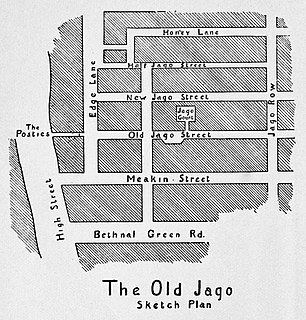 W
WA Child of the Jago is an 1896 novel by Arthur Morrison.
 W
WComing Apart: The State of White America, 1960–2010 is a 2012 book by Charles Murray, a political scientist and W.H. Brady Scholar at the American Enterprise Institute.
 W
WDays of Destruction, Days of Revolt is a 2012 illustrated non-fiction book authored by Chris Hedges and illustrated by Joe Sacco, chronicling life in poverty in different parts of the United States.
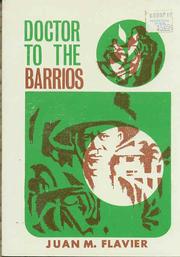 W
WDoctor to the Barrios is a 1970 book written by Juan M. Flavier, a physician in the Philippines, who later became Secretary of the Department of Health and two-term Senator of the Philippines. Its complete title is Doctor to the Barrios, Experiences with the Philippine Rural Reconstruction Movement.
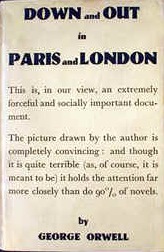 W
WDown and Out in Paris and London is the first full-length work by the English author George Orwell, published in 1933. It is a memoir in two parts on the theme of poverty in the two cities, which was written deliberately in a non-academic tone. Its target audience was the middle and upper class members of society—those who were more likely to be well educated—and exposes the poverty existing in two prosperous cities: Paris and London. The first part is an account of living in near-destitution in Paris and the experience of casual labour in restaurant kitchens. The second part is a travelogue of life on the road in and around London from the tramp's perspective, with descriptions of the types of hostel accommodation available and some of the characters to be found living on the margins.
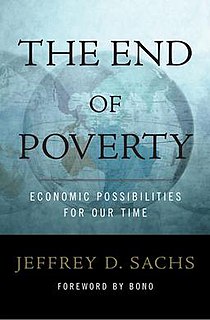 W
WThe End of Poverty: Economic Possibilities for Our Time (ISBN 1-59420-045-9) is a 2005 book by American economist Jeffrey Sachs. It was a New York Times bestseller.
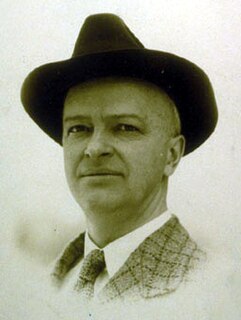 W
WHarry Hamilton Laughlin was an American educator, eugenicist, and sociologist. He served as the Superintendent of the Eugenics Record Office from its inception in 1910 to its closing in 1939, and was among the most active individuals in influencing American eugenics policy, especially compulsory sterilization legislation.
 W
WGood Economics for Hard Times: Better Answers to Our Biggest Problems (2019) is a non-fiction book by Abhijit V. Banerjee and Esther Duflo, both professors of Economics at MIT. It was published on November 12, 2019 by PublicAffairs (US), Juggernaut Books (India) and Allen Lane (UK). The book draws from recent developments in economics research to argue solutions to the issues facing modern economies and societies around the world, including slowing economic growth, immigration, income inequality, climate change, globalization and technological unemployment. It is their second collaborative book since the publication of their book Poor Economics: A Radical Rethinking of the Way to Fight Global Poverty (2011) and their first since becoming a married couple in 2015. The book's publication comes a month after Banerjee and Duflo were jointly awarded the Nobel Prize in Economics, shared with Harvard University professor Michael Kremer.
 W
WHand to Mouth: Living in Bootstrap America is the debut book by author Linda Tirado. The book was released on 2 October 2014 and contains a foreword written by Barbara Ehrenreich.
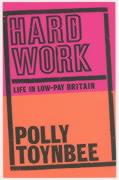 W
WHard Work: Life in Low-pay Britain is a 2003 book by the British journalist Polly Toynbee.
 W
WHow the Other Half Dies: The Real Reasons for World Hunger is a book by Franco-American activist Susan George, a member of the Transnational Institute. It was originally published in 1976, not long after the World Food Conference, and has been reprinted several times since.
 W
WHunger is a novel by the Norwegian author Knut Hamsun published in 1890. Extracts from the work had previously been published anonymously in the Danish magazine Ny Jord in 1888. The novel has been hailed as the literary opening of the 20th century and an outstanding example of modern, psychology-driven literature. Hunger portrays the irrationality of the human mind in an intriguing and sometimes humorous manner.
 W
WLondon Labour and the London Poor is a work of Victorian journalism by Henry Mayhew. In the 1840s, he observed, documented, and described the state of working people in London for a series of articles in a newspaper, the Morning Chronicle, that were later compiled into book form.
 W
WThe Minds of Marginalized Black Men is a non-fiction book written by Alford A. Young Jr. Young explores the lives of impoverished young black men living in the near New West Side of Chicago, Illinois in order to get a better understanding of how they view their lives and what they want for their futures. The book was first published in 2004 by Princeton University Press.
 W
WMore Than Good Intentions: How a New Economics is Helping to Solve Global Poverty is a non-fiction book by Yale economist Dean Karlan and field researcher Jacob Appel published in 2011. It combines insights from behavioral economics with field research from developing countries to discuss and evaluate international development and poverty-alleviation programs. The authors describe the book as “...a new way to understand what really works to reduce poverty...”
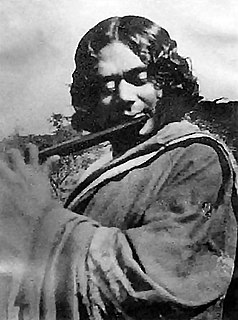 W
WMrityukshuda (1930) is a Bengali novel by Kazi Nazrul Islam. It is one of only three novels written by him. The author saw the Bolshevik revolution in Russia, with its unapologetic enthusiasm for science and rationalism, as well as the possibilities it seemed to open up for normal, everyday people to create social justice and development for themselves, as profoundly attractive; the depiction of Ansar, a character in the novel, is a reflection of that. The novel has 28 parts. Ansar and Pakale are the main characters.
 W
WMy Secret Life on the McJob: Lessons from Behind the Counter Guaranteed to Supersize Any Management Style is a book by Jerry Newman about low-wage work in fast-food outlets. Newman is a distinguished professor at University at Buffalo (N.Y.) School of Management who has taught business courses for nearly 30 years, and went undercover as a bottom-rung worker for the biggest names in fast food, including McDonald's and Burger King.
 W
WThe Nature of Mass Poverty is an economics book by John Kenneth Galbraith published in 1979, in which Galbraith draws on his experiences as ambassador to India to explain the causes for and solutions to poverty. He begins by differentiating so-called "case poverty" of individuals from "mass poverty", largely observed in rural areas of the developing world.
 W
WNickel and Dimed: On (Not) Getting By in America is a book written by Barbara Ehrenreich. Written from her perspective as an undercover journalist, it sets out to investigate the impact of the 1996 welfare reform act on the working poor in the United States.
 W
WNomadland: Surviving America in the Twenty-First Century is a 2017 work of non-fiction by Jessica Bruder.
 W
WThe Other America (ISBN 0-684-82678-X) is Michael Harrington's best known and likely most influential book. He was an American democratic socialist, writer, political activist, political theorist, professor of political science, radio commentator, and founding member of the Democratic Socialists of America. He believed that American Socialists could support certain Democratic Party candidates, including candidates for President.
 W
WThe People of the Abyss (1903) is a book by Jack London about life in the East End of London in 1902. He wrote this first-hand account after living in the East End for several weeks, sometimes staying in workhouses or sleeping on the streets. In his attempt to understand the working-class of this deprived area of London the author stayed as a lodger with a poor family. The conditions he experienced and wrote about were the same as those endured by an estimated 500,000 of the contemporary London poor. London also used the expression "the people of the abyss" in his later dystopian novel The Iron Heel (1907).
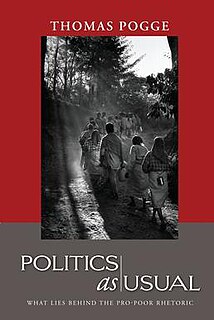 W
WPolitics as Usual: What Lies Behind the Pro-Poor Rhetoric is a 2010 book by Thomas Pogge. The book is a discussion on issues of global significance and their relationship to poverty. Politics as Usual is based on previously compiled essays. Pogge's book present an alternate view than the one where "Education, health-care, technology, and political participation are becoming ever more universal, empowering human beings everywhere to enjoy security, economic sufficiency, equal citizenship, and a life in dignity." according to Crop. He presents one where Poverty and oppression persist on a massive scale, one where the affluent states and international organizations knowingly contribute and even benefit from these evils.
 W
WPoor Economics: A Radical Rethinking of the Way to Fight Global Poverty (2011) is a non-fiction book by Abhijit V. Banerjee and Esther Duflo, both professors of Economics at Massachusetts Institute of Technology (MIT). The book reports on the effectiveness of solutions to global poverty using an evidence-based randomized control trial approach. It won the 2011 Financial Times and Goldman Sachs Business Book of the Year Award.
 W
WPortfolios of the Poor: How the World's Poor Live on $2 a Day is a book that aims to systematically explain how the poor find solutions to their everyday financial problems. It is written by Stuart Rutherford, Jonathan Morduch, Orlanda Ruthven, and Daryl Collins.
 W
WPoverty, A Study of Town Life is the first book by Seebohm Rowntree, a sociological researcher, social reformer and industrialist, published in 1901. The study, widely considered a seminal work of sociology, details Rowntree's investigation of poverty in York, England and the subsequent implications that arise from the findings, in regard to the nature of poverty at the start of the 20th century. It also marks the first usage of a poverty line in sociological research.
 W
WProgress and Poverty: An Inquiry into the Cause of Industrial Depressions and of Increase of Want with Increase of Wealth: The Remedy is an 1879 book by social theorist and economist Henry George. It is a treatise on the questions of why poverty accompanies economic and technological progress and why economies exhibit a tendency toward cyclical boom and bust. George uses history and deductive logic to argue for a radical solution focusing on the capture of economic rent from natural resource and land titles.
 W
WRipley Bogle is the debut novel of Northern Irish author Robert McLiam Wilson, published in 1989 in the UK although not until 1998 in the US. Written when he was 26 it is arguably his most acclaimed, winning the Rooney Prize and the Hughes Prize in 1989, and a Betty Trask Award and the Irish Book Awards the following year. Many elements of the novel are autobiographical; the author himself was born in Belfast, attended Cambridge University, dropped out and became homeless. It is regarded as a significant novel, producing "both a re-evaluation of Northern Irish literary identity, and an alternative perspective on the Troubles."
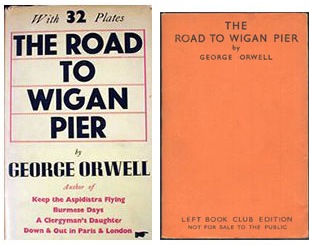 W
WThe Road to Wigan Pier is a book by the English writer George Orwell, first published in 1937. The first half of this work documents his sociological investigations of the bleak living conditions among the working class in Lancashire and Yorkshire in the industrial north of England before World War II. The second half is a long essay on his middle-class upbringing, and the development of his political conscience, questioning British attitudes towards socialism. Orwell states plainly that he himself is in favour of socialism, but feels it necessary to point out reasons why many people who would benefit from socialism, and should logically support it, are in practice likely to be strong opponents.
 W
WScratch Beginnings: Me, $25, and the Search for the American Dream is a book by Adam Shepard, a graduate of Merrimack College, about his attempt to live the American Dream. It was conceived as a refutation of the books Nickel and Dimed and Bait and Switch by Barbara Ehrenreich.
 W
WStone Cold is a realistic young-adult novel by Robert Swindells, published by Heinemann in 1993. Set on the streets of London, the first-person narrative switches between Link, a newly-homeless sixteen-year-old adjusting to his situation, and Shelter, an ex-army officer scorned after being dismissed from his job, supposedly on "medical grounds".
 W
WThe Truly Disadvantaged: The Inner City, the Underclass, and Public Policy is a book by William Julius Wilson. The book was first published in 1987; a second edition was published in 2012. It examines the relationship between race and poverty in the United States, and the history of American inner-city ghettos. The broad-ranging book rejects both conservative and liberal arguments for the social conditions in American inner cities. In it, Wilson argues that the decline of such conditions is due to "basic economic changes which radically altered the occupational structure of the central cities," such as the withdrawal of large industries from inner cities during the 1970s. He also criticizes the architects of the War on Poverty during the 1960s, saying that they focused too much on poverty as a problem of environment rather than as a problem of "economic organization".
 W
WTunnel People is an anthropological-journalistic account describing an underground homeless community in New York City. It is written by war photographer and anthropologist Teun Voeten and was published by the Oakland-based independent publishing house PM Press in 2010.
 W
WUnspeakable Things: Sex, Lies and Revolution is a 2014 book by British journalist, author and political activist Laurie Penny.
 W
WWhen Helping Hurts: Alleviating Poverty Without Hurting the Poor.. . and Yourself is a 2009 non-fiction book by Steve Corbett and Brian Fikkert. The book was first published on June 24, 2009 through Moody Publishers and explores and dissects common perceptions on poverty and the means to relieve it, from a Christian perspective. In 2012, Moody published a revised, second edition. By June 2015, When Helping Hurts had sold more than 300,000 copies and been translated into 5 languages.
 W
WThe Working Poor: Invisible in America is a 2004 book written by Pulitzer Prize-winner David K. Shipler. From personal interviews and research, Shipler presents in this book anecdotes and life stories of individuals considered the working poor. Using their lives as examples, he illustrates the struggles the working poor face while attempting to escape poverty. Throughout the book, the author describes numerous economic issues preventing the working poor from escaping poverty.
 W
WWorld Poverty and Human Rights: Cosmopolitan Responsibilities and Reforms is a 2002 book by Thomas Pogge. In the book, Pogge explains that the poorest 44 percent of humankind have 1.3 percent of global income and their purchasing power per person per day is less than that of $2.15 in the US in 1993; 826 million of them do not have enough to eat. One-third of all human deaths are from poverty-related causes: 18 million annually, including 12 million children under five.